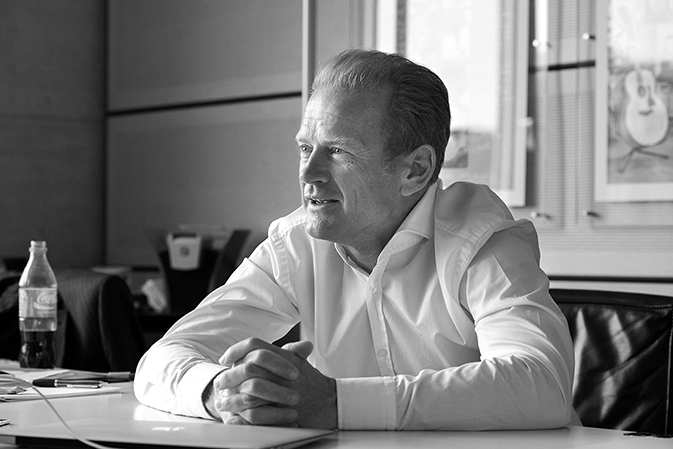A votre avis, quels sont les ingrédients du succès de l'entreprise Swisscom?
Le principal ingrédient est le capital de confiance que nous témoignent nos clients. Au regard de la position et du rôle particuliers de Swisscom en Suisse, nous devons également assumer une certaine responsabilité. La confiance qui nous est témoignée implique également certaines attentes. Si nous n'y répondons pas, la confiance s'érode. Exemple: sans cette confiance, nous n'aurions jamais réussi à percer sur le marché de l'informatique. Sur les quelque 300 établissements bancaires établis actuellement en Suisse, près de deux tiers nous ont confié leur informatique. C'est une affaire de confiance. Le deuxième ingrédient, la deuxième valeur, c'est l'identification des collaborateurs avec leur entreprise. Lorsque vous vous rendez dans l'un de nos magasins, vous sentez que nos collaborateurs sont fiers de faire partie de notre entreprise. Le client perçoit cette identification, cette motivation et cette passion. Le troisième ingrédient, c'est notre orientation sur le long terme. Swisscom affiche une grande stabilité au sein de ses équipes de dirigeants et en termes de stratégie. Et le tout commence avec la vision de nos actionnaires sur le long terme.
Le Conseil fédéral travaille sur une réforme de la prévoyance-vieillesse, la Gauche exige l'extension généralisée du 1er pilier au détriment du 2e pilier. Les caisses de pension vont-elles devoir affronter des périodes mouvementées?
En Europe, se pose la question de la solidité du financement des institutions sociales, surtout de celui des caisses de retraite? Et par voie de conséquence, il convient de se demander pour qui paient les actifs? Si les personnes en activité sont mises à contribution essentiellement pour financer les actuels bénéficiaires de rentes, nous avons un problème. Ceci ne transparaît pas forcément dans le taux de couverture, car il s'agit d'un calcul technique qui repose sur des postulats et des paramètres. Actuellement, lorsqu'une caisse de pension affiche un taux de couverture de 100%, ce dernier n'est dans la réalité sûrement pas de 100% – car il a été déterminé avec une espérance de vie trop basse et un rendement trop élevé. Considérant l'évolution de la pyramide des âges ainsi que les défis structurels généraux qui se posent à l'Europe, je suis convaincu que les institutions sociales vont bientôt traverser des périodes troublées. Mais qui osera le premier réclamer des réformes?
comPlan, la caisse de pension de Swisscom, offre d'excellentes prestations à ses assurés. Et même depuis la correction à la baisse annoncée, le principe de la primauté des prestations est maintenu. Cette promesse de prestations est-elle encore réellement tenable?
comPlan applique un système de double primauté, un mélange de primauté des cotisations et de primauté des prestations. Peut-elle encore tenir ses promesses? Je ne peux que vous répondre par oui et non. Cette promesse repose sur des attentes. Au regard du contexte macroéconomique actuel, lequel devrait rester provisoirement extrêmement volatile, il est difficile d'évaluer quelle rémunération peut effectivement être atteinte. Il ne faut pas oublier la crise de l'euro ou l'endettement des Etats-Unis. Qui peut prédire aujourd'hui l'évolution à long terme des taux d'intérêt et des rendements? En conséquence, toute affirmation reposant sur un postulat d'une rémunération à 3,5 ou 3,75% revêt un caractère extrêmement spéculatif. Il serait dangereux de donner l'impression au salarié qu'une sécurité totale est possible. Dans le même temps, de tels engagements ne sont pas pris à la légère, ils reposent sur une certaine stratégie de placement. Or, dans un contexte aussi volatil justement, il est important de faire avancer les réformes dans le cadre d'un dialogue avec les partenaires sociaux, car ignorer son mal de tête n'est jamais une bonne solution. Remettre les réformes à plus tard, c'est courir le risque d'obstacles de plus en plus élevés et de conflits potentiels de plus en plus importants.
Les entreprises technologiques doivent affronter un survieillissement de leurs caisses de pension du fait d'un ratio de plus en plus défavorable entre l'effectif des actifs et celui des bénéficiaires de rentes. Swisscom a-t-elle déjà pensé à ouvrir sa caisse de pension à des entreprises tierces?
Non, cela ne nous intéresse pas. Si nous proposons un tel service à des tiers, alors nous devrons nous efforcer de générer de la valeur ou de mieux répartir les risques. Or, devant l’imminence des périodes mouvementées que vont devoir traverser les institutions sociales, je doute que cela soit une bonne idée.
Quelle évolution attendez-vous pour les 3 à 5 années à venir dans le domaine de la LPP?
Je n'ai aucun moyen de répondre à cette question, même si je le voulais. Il faut des réformes, et elles dépendent du courage des politiques. Par exemple, le relèvement de l'âge de la retraite. Tôt ou tard, il faudra bien aborder cette question. En effet, comme je l'ai déjà évoqué, plus on repousse la discussion, plus elle sera délicate.
Si vous pouviez aujourd'hui donner un conseil aux caisses de pension en Suisse, quel serait-il?
Chercher activement le dialogue avec les partenaires sociaux. Les réformes doivent être menées en continu. Or, cela ne peut fonctionner que dans le cadre d'une relation de confiance avec les partenaires sociaux. Pour préserver la durabilité de notre institution sociale, il nous a fallu entretenir le dialogue. L'espérance de vie des êtres humains ne cesse d'augmenter, tandis que le contexte macroéconomique demeure volatil. Si l'on ne serre pas régulièrement les vis du système, c'est la solidarité toute entière qui sera mise à mal. Quiconque laisse les choses en l'état pendant deux ans a déjà perdu.



